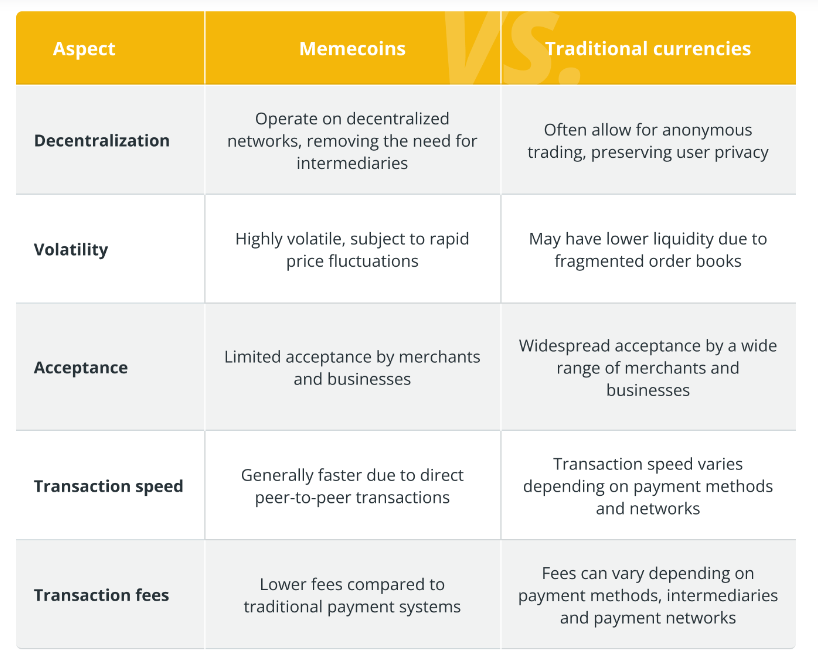The reliability and security of Memecoins as a medium of trade are still up for question in the crypto sphere. Although some people believe memecoins to be secure and decentralized, others worry about their volatility and lack of regulation.
The decentralized nature of memecoins, according to its proponents, gives users greater control over their finances and protection from fraud and theft. Memecoins also make use of blockchain technology, guaranteeing that transactions are securely recorded on a decentralized ledger and protecting them from manipulation and hacking.
On the other side, because of their decentralized nature and absence of governmental regulation, memecoins are more susceptible to heightened volatility and market manipulation.
Because of their propensity for abrupt, unexpected price movements, memecoins volatility is concerning. Memecoins may therefore pose challenges when used as a reliable means of trade or store of value. However, by putting the right laws in place, these dangers may be minimized, increasing the security and trustworthiness of meme coins as a medium of trade.
But it’s crucial to find the right balance between regulation and innovation. Overregulation might stifle innovation and prevent the development of the memecoin ecosystem.
To be a useful type of currency, memecoins must be made long-term secure and dependable; as a result, it’s critical to develop a legal framework that tackles issues while encouraging innovation.
Related: List Of Companies That Accepts Dogecoin As Payments
Memecoins vs traditional currencies
Meme coins as a means of exchange have a number of advantages over traditional currencies, but their volatility and lack of popularity may make it challenging for them to be broadly used. Considering the ongoing development of their underlying infrastructure and technology, it is uncertain if memecoins will be a frequently utilized medium of exchange.
The decentralized nature of memecoins is one of their advantages. There is no requirement for middlemen like banks or payment processors to assist transactions between two parties because memecoins are not managed by a single institution. Memecoins’ reduced transaction costs and increased transaction speed make them potentially useful as a means of trade.
However, memecoins’ high level of volatility is a huge disadvantage when compared to traditional currencies. Meme coins are a volatile store of value due to their wide price fluctuations. This might make it difficult for individuals and businesses to maintain effective budgets or to accept memecoins as payment.
Another drawback is the limited degree of acceptance of meme coins. Despite not being widely utilized yet, some businesses and stores accept memecoins as a form of payment. This could make it more difficult for consumers to conduct everyday transactions with memecoins.

Source: Cointelegraph
Integrating memecoin into mainstream payment systems
Memecoins will need to be integrated into widely used payment systems, which will require cooperation from developers, payment processors, financial institutions, retailers, and customers.
Before Meme coins can be included in conventional payment systems, they would need to be extensively utilized and accepted. This would include promoting the use of meme coins as a form of payment for products and services provided by companies as well as providing users with quick and safe options to convert meme coins into fiat currency. One potential solution is the development of payment processors that can instantaneously convert meme coins into fiat money at the point of sale.
The ability to send memecoins to friends and family is made simple for users by the potential for meme coin wallets to integrate with already-existing payment platforms like PayPal and Venmo. Another option is the development of meme coin debit cards, which may be used at any business that accepts standard debit cards. To be extensively used, meme coins will nonetheless need to overcome problems with security, volatility, and regulatory compliance.
Alternatively, smart contracts might be developed to settle transactions for a business that takes meme coins, automatically converting memecoins to dollars at the current exchange rate. Customers and merchants would benefit from a quicker and more secure payment procedure, and payment processors wouldn’t need to convert meme coins to fiat money. Furthermore, smart contracts may be set up to adhere to relevant laws and regulations, which may help allay concerns regarding legal compliance.
Read Also: How To Buy And Trade Altcoins: A Beginners Guide
Ethical implications of using memecoins as currency
Memecoins’ speculative character, environmental effect, possibility for illegal activity, and escalation of economic inequality are some of the ethical implications of utilizing them as money.
One of the main problems is that rather than being valued for their intrinsic value or utility, meme coins’ value is sometimes decided simply by speculation and excitement. Meme coins can produce volatility, which might be bad for consumers and investors who depend on stable currencies for financial security.
Concerns exist over the effect of memecoins on the environment as well, especially in light of the energy required for mining. Many memecoins, like Dogecoin (DOGE), rely on mining, which consumes a lot of energy and computer resources. As a result, questions about the carbon footprint of memecoins and their possible impact on climate change have been raised.
Another concern is the possible role of meme coins in illegal activities including money laundering and the support of criminal enterprises. Memecoins’ anonymity and lack of regulation make them a potentially appealing option for anyone looking to participate in illegal activity.
Finally, the usage of meme coins as a medium of exchange might exacerbate existing economic disparities since those who have the means and expertise to invest in meme coins may profit monetarily while people without these abilities may fall behind.


